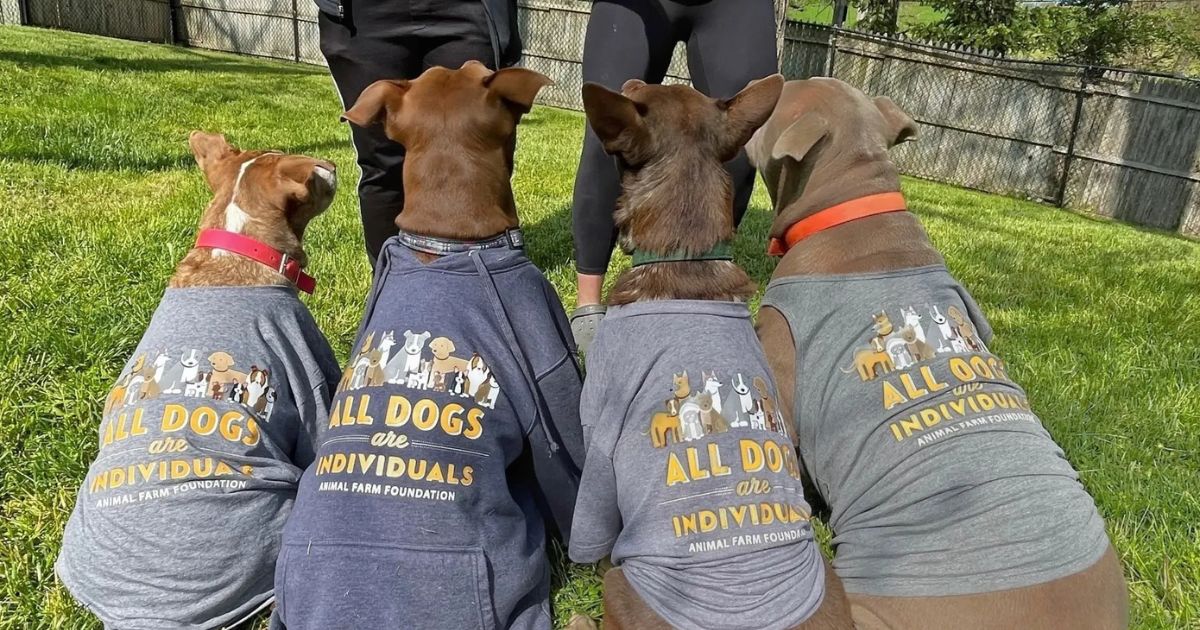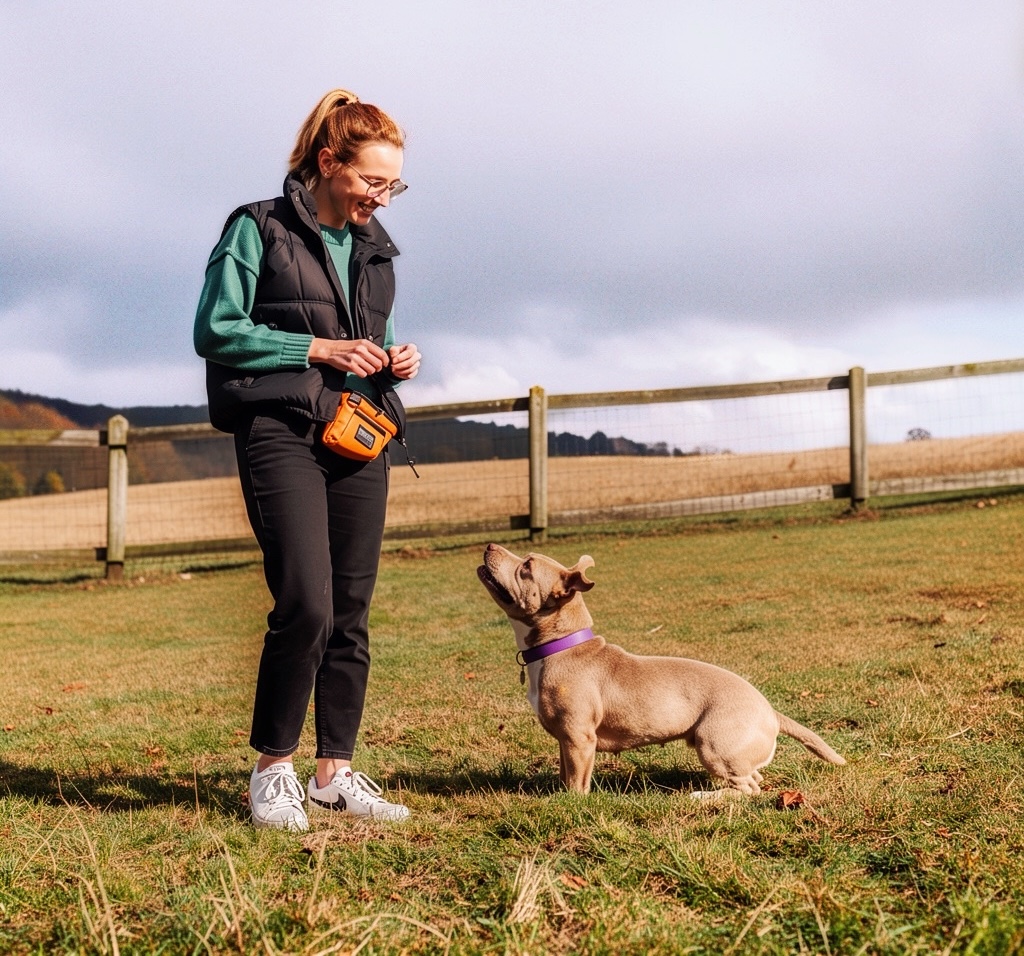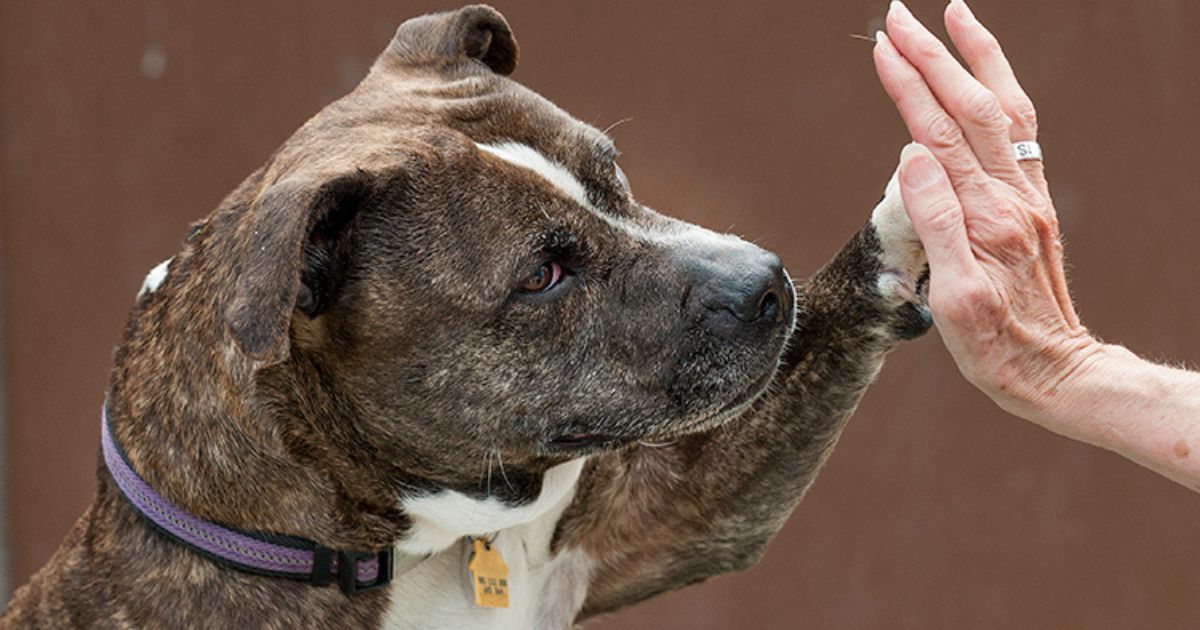Animal Farm Foundation’s mission is to secure equal treatment and opportunity for “pit bull” dogs. In an effort to meet that mission, we established a Service Dog Training program so that rescued and sheltered “pit bull” dogs can be considered for the same work traditionally reserved for pure bred, purpose bred dogs.
Our first three teams have been placed: Margierose and Captain America in New York, Matthew and Jericho in Maryland, and Vicki and Parker in North Carolina. They are all “pit bull” dogs who were in regular shelters before they were evaluated for and entered our program. None were bred for this purpose, but all three are excelling in their new lives as assistance dogs.
The dogs were tasked trained by Apryl Lea, an Assistance Dogs International (ADI) trainer on our staff. Lea enjoys working with shelter “pit bull” dogs in this capacity. She believes there is a common misperception by both the public and the service dog industry that dogs can’t be service dogs unless they are a specific breed or bred for the purpose of assistance dog work. As Lea points out, no matter what breed of dog, the training process to become a service dog is the same, “A dog is a dog! The training is the same.”

Trained by Lea to retrieve dropped items, help with balance, brace on stairs, and get the phone in an emergency, Service Dog Captain America has been assisting Margierose since December 2012. She reports that his training has paid off, “He is not just my service dog, but my best friend where ever I go. As soon as I put his vest on he is very much like the super hero with his cape, but instead of leaping tall buildings he makes me feel safe and confident out in public. Captain picks up items I drop and braces me when my balance is off and I am feeling dizzy. He will even go get the phone for me when I am having a bad day.”
Service Dog Jericho, was also trained for tasks such as opening doors, retrieving items, and bracing his owner Matthew as he transfers from his wheel chair. Matthew, who lost the use of his legs in a car accident, is provided increased independence with the help of Jericho by his side.

Our most recent placement, Service Dog Parker, was trained to retrieve items, open doors, retrieve water from the fridge, brace on stairs, and go get help for his owner Vicki. Living with a lung disorder that impairs her ability walk and causes dizziness, Vicki gets help from Parker who provides her with the independence (and motivation) to visit some of her favorite public places, such as the beach!

Unfortunately discrimination against “pit bull” dogs has had an impact on service dog teams around the country. In 2011 the town of Aurelia, Iowa, which has a ban on “pit bull” dogs, forced Jim Sak, a disabled Vietnam Veteran and retired Chicago Police Officer who had recently moved to Aurelia, to remove his service dog (a “pit bull” dog named Snickers) from town limits. Animal Farm was able to assist Officer Sak in regaining custody of his dog. Read more about Office Sak here. More recently, a (former) ban on “pit bull” dogs in one Rhode Island town led to a service dog being confiscated from his disabled owner.
These cases are sad examples of what happens when local governments discriminate against dogs based on breed or appearance. Breed discriminatory legislation does nothing to enhance public safety, but it’s expensive to enforce, tears apart families (including service dog teams), and divides communities. On a federal level, banning “pit bull” service dogs violates 2010 guidance from the United States Department of Justice (DOJ) on breed limitations for service dogs and violates Title II of the American with Disabilities Act. Animal Farm is committed to securing the rights of service dog teams who are adversely affected by discriminatory policies.
In an effort to educate the public about Service Dogs (otherwise known as Assistance Dogs), the people who live with them, and our program here at AFF, here are a few things to know:
Service animals are defined as dogs that are individually trained to do work or perform tasks for people with disabilities. Service Animals are legally defined (Americans With Disabilities Act, 1990) and are trained to meet the disability-related needs of their handlers who have disabilities. Federal laws protect the rights of individuals with disabilities to be accompanied by their service animals in public places. Service animals are not considered ‘pets’. Examples of the work or tasks they are trained to perform include: guiding people who are blind, alerting people who are deaf, pulling a wheelchair, alerting and protecting a person who is having a seizure, reminding a person with mental illness to take prescribed medications, calming a person with Post Traumatic Stress Disorder (PTSD) during an anxiety attack, or performing other duties. The work or task a dog has been trained to provide must be directly related to the person’s disability.

Dogs of all breeds and mixes can become service dogs. It’s the individual dog, not the breed that matters most when selecting dogs. After further assessments, some dogs who enter our program at AFF wind up not making the final cut. We are careful to only choose and train dogs who exhibit a desire to perform the tasks we are training them to do. If a dog isn’t the right fit for our program, they are placed up for adoption through our shelter.
Therapy Dogs are not the same as Service Dogs (Assistance Dogs). Service dogs are protected by federal law. Therapy and Emotional-Support dogs are not. Therapy dogs are those that provide comfort to people in a variety of settings, such as hospitals and retirement homes. Emotional Support dogs can provide comfort to their owners, but are not the same as Psychiatric Service Dogs. They are not required to perform certain tasks related to a person’s disability and can be refused access to places where service dogs are allowed.
There is no national certification process for service dogs, nor are they required to be trained by a certified assistance dog trainer. Owners are allowed to personally train their service dog for their own specific needs. What qualifies a dog as a service dog is the help the dog provides for an individuals with a disability.
AFF has an Assistance Dogs International (ADI) trainer on staff, even though it’s not required. We believe in the objectives of the ADI. Having an ADI certified trainer on staff is a demonstration of our commitment to the program. It’s also a way for us to help “pit bull” dogs secure inclusion in ADI’s respected program.

It is illegal to ask someone what their disability is or require training certification. When it is not obvious what service a dog provides, only limited inquiries are allowed by law. Businesses cannot ask about the person’s disability, require medical documentation, require a special identification card or training documentation for the dog, or ask that the dog demonstrate its ability to perform the work or task. Businesses may ask two questions:
Is the dog a service animal required because of a disability?
What work or task has the dog been trained to perform?
It is illegal to impersonate a service dog team in order to gain access to public space or transportation with your pet dog (even if they are a therapy dog). Fake service dogs are a growing problem and cause serious problems for legitimate service dog teams. Faking a “service” dog has real consequences for disabled people who rely on their specially trained dogs. Imposters create a hostile, distrustful environment for dogs and their handlers.
If you encounter a service dog, do not distract them from doing their job. In other words, do not pet them, do not call out to them, and do not allow your dogs or children to approach them. Distracting a service dog could result in an accident for the handler. For more on service dog etiquette please visit this site.

For more information about assistance dogs, please see ADI.
To nominate a “pit bull” dog for our program or to learn more about our work, please visit our site.





